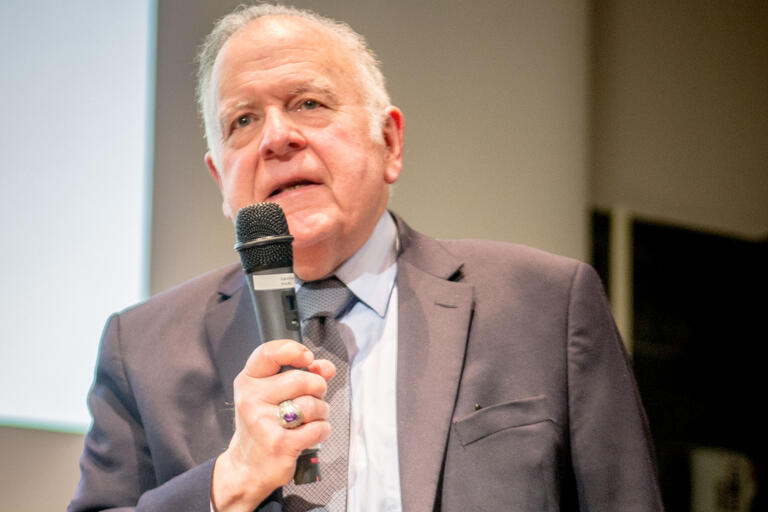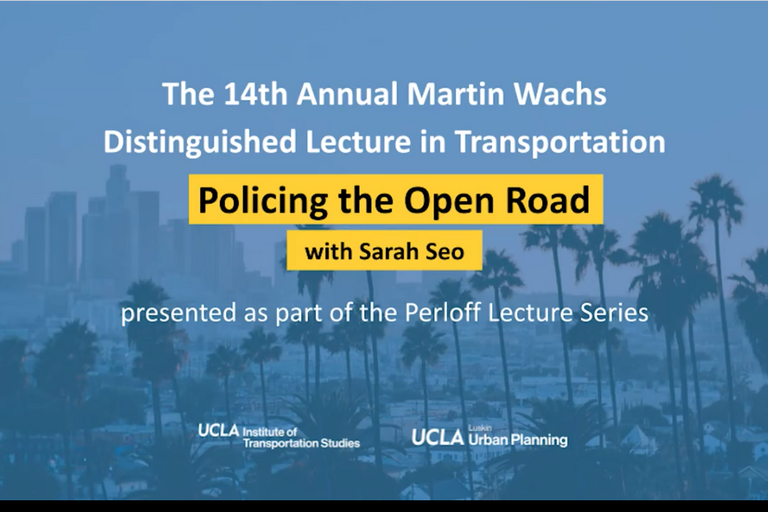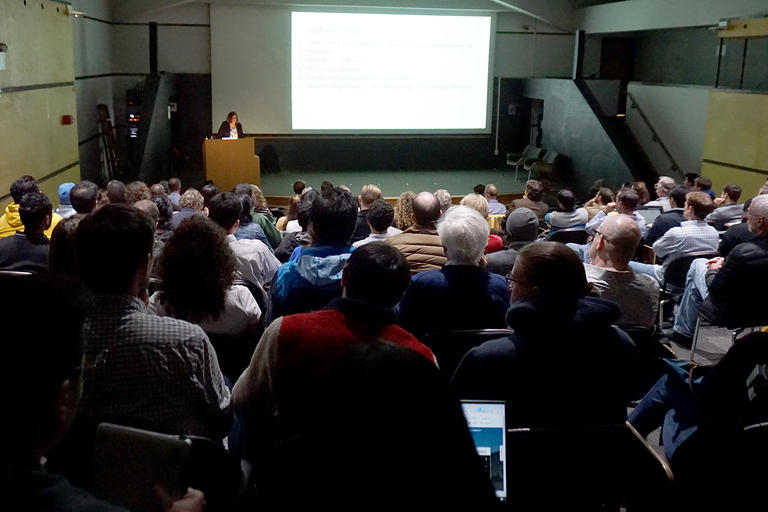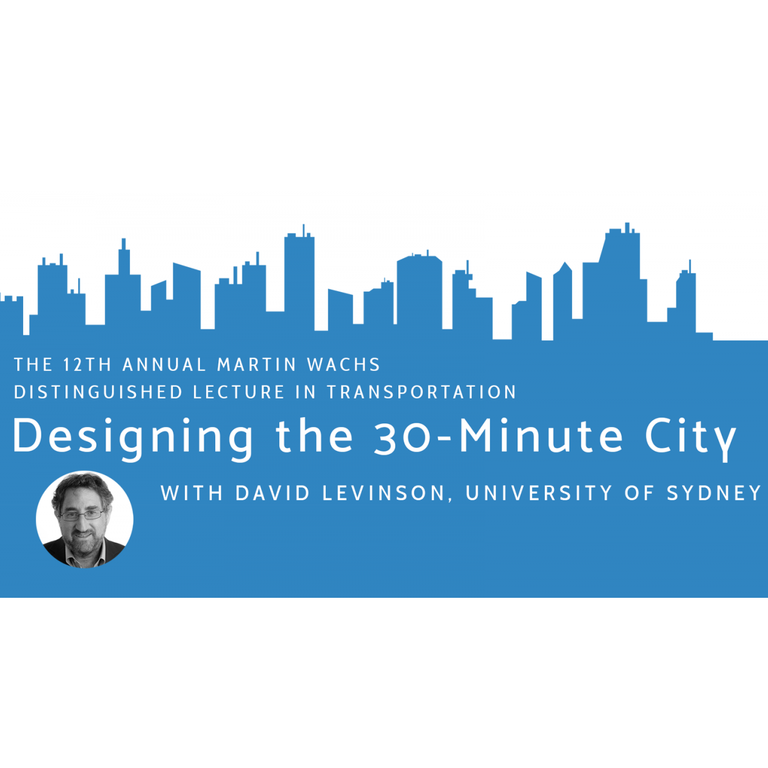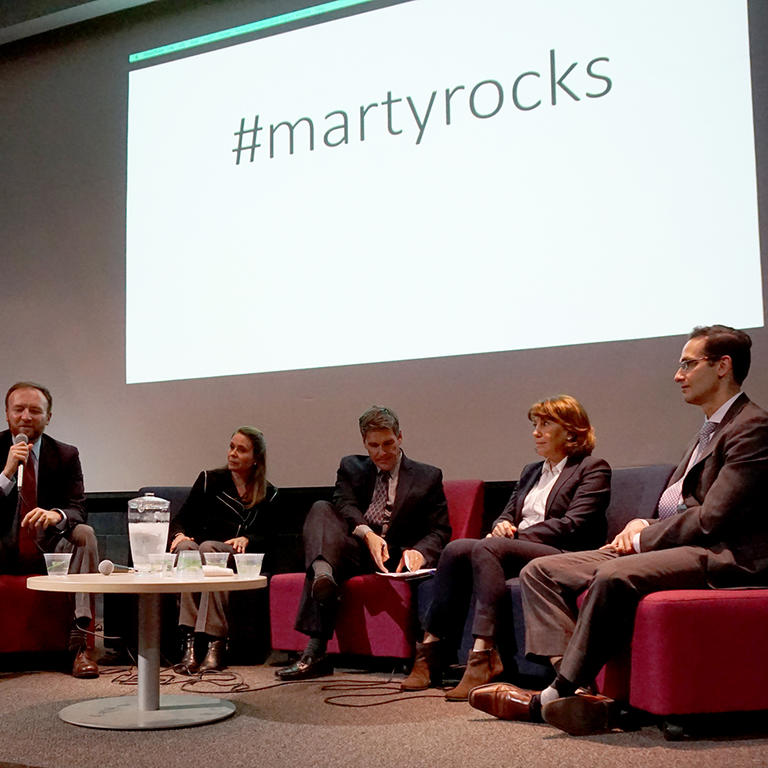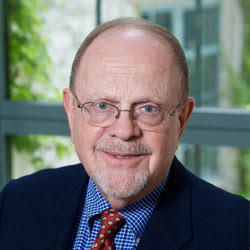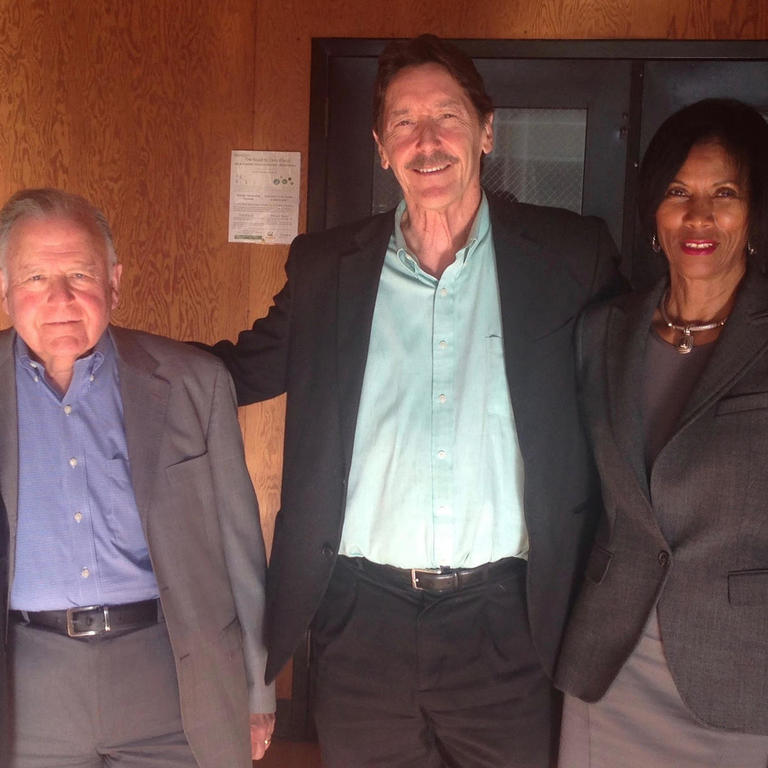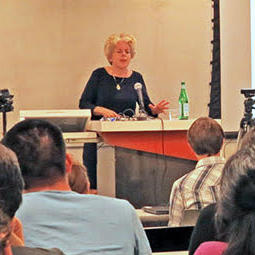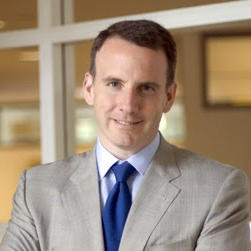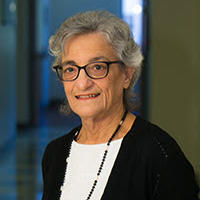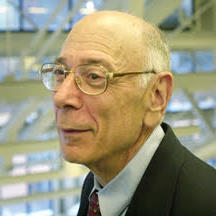Each year the annual Wachs Lecture draws innovative thinkers to the University of California to address today’s most pressing issues in transportation. Created by students to honor Professor Martin Wachs upon his retirement from the University, the lecture rotates between Berkeley and UCLA, the campuses at which Marty taught.

Presented as part of the UCLA Urban Planning and UCLA Institute of Transportation Studies Perloff Lecture Series. Each year the annual Wachs Lecture draws innovative thinkers to the University of California to address today’s most pressing issues in transportation. Created by students to honor Professor Martin Wachs upon his retirement from the University, the lecture rotates between Berkeley and UCLA, the campuses at which Marty taught.
Wachs Lecture with Robert Hampshire | Lessons in Leading Mission-Based Innovation in Transportation
In this lecture, Robert Hampshire, Associate Professor of Public Policy at the University of Michigan, drew from his experience as the former Chief Science Officer and Assistant Secretary for Research and Technology at the U.S. Department of Transportation. He shared firsthand insights from national case studies on roadway and aviation safety, supply chain disruptions, and unmanned aerial systems (UAS). In conversation with Ann E. Carlson, Faculty Director, Emmett Institute on Climate Change & the Environment, Hampshire explored how a mission-driven, cross-sector approach can help eliminate transportation fatalities, reduce carbon emissions, and ensure access for all travelers. The 2025 Wachs Distinguished Lecture, presented as part of the Luskin Lecture Series
00:00 Welcome from Adam Millard-Ball, Director of UCLA Institute of Transportation Studies
04:55 Presentation from Robert Hampshire
35:15 Discussion with Ann Carlson
01:11:10 Audience Q&A
01:28:05 Closing by Adam Millard-Ball
Columbia Law professor Sarah Seo‘s book “Policing the Open Road” is a thought-provoking look at how the automobile fundamentally changed the nature of police work, and thus the conception of freedom, in the United States. These themes are close to transportation studies, but too often ignored in transportation academia. Professor Seo will be joined by UCLA professor Genevieve Carpio, whose book, “Collisions at the Crossroads: How Place and Mobility Make Race,” documents the effects of police-imposed limits to mobility on Latinx populations in Southern California’s Inland Empire. See the lecture: https://its.berkeley.edu/news/wachs-distinguished-lecture-policing-open-...
Professor Emerita of City and Regional Planning and Urban Design, Elizabeth “Betty” Deakin recently presented the Martin Wachs Lecture, “Integrating Transportation, Land Use, and Environmental Planning for Social Justice and Carbon Reduction: Finding a Way that Works,” on Thursday, November 14 on the UC Berkeley campus, followed by a reception.
Now in its twelfth year, the annual Wachs Lecture draws innovative thinkers to the University of California to address today's most pressing issues in transportation.
Created by students to honor Professor Martin Wachs upon his retirement from the University, the lecture rotates between Berkeley and UCLA, the campuses at which Marty taught.
Deakin also received the 2019 ACSP Distinguished Educator Award, presented biennially to those who have made significant contributions to planning research and practice, and have demonstrated excellence in teaching and public service.
The 30-minute isochrone has long defined people’s use of cities — from ancient times through the trams era to modern times. Transportation networks and developments co-evolve as technology advances, but this 30-minute constraint remains relatively constant. This talk will discuss the measurement of accessibility, why it matters, and how it might affect traveler behavior, institutional behavior, and public policy. It’ll also delve into accessibility’s implications through the lens of public transportation systems in Sydney from the 1800s and Australia today.
David Levinson is a professor in the School of Civil Engineering at the University of Sydney and adjunct faculty in the Department of Civil, Environmental, and Geo-Engineering at the University of Minnesota. He has also served as managing director of the Accessibility Observatory, director of the Networks, Economics, and Urban Systems (NEXUS) research group and Richard P. Braun/CTS Chair in Transportation (2006-2016). In 2005, Levinson was awarded the new faculty award by the Council of University Transportation Centers/American Road & Transportation Builders Association. He has a PhD in transportation engineering from UC Berkeley.
Watch the lecture: https://www.youtube.com/watch?v=ims0ppfOE_k
Smart Cities: The future of urban infrastructure 2018 Martin Wachs Lecture panel features former students, post docs and colleagues of Martin Wachs and focused on the discussion of Smart Cities and the role that urban infrastructure and transportation will have.
Speakers: Jeff Morales (Moderator): Former Executive Director of Caltrans; Former Chief Executive Officer of California High Speed Rail Authority; Senior Fellow at UC Berkeley’s Institute of Transportation Studies; Ryan Russo: Director of Oakland’s new Department of Transportation; former Deputy Commissioner of Transportation at New York City Department of Transportation (NYCDOT); Tom Maguire: Director, Sustainable Streets at San Francisco Municipal Transportation Agency (SFMTA) and former Assistant Commissioner at NYCDOT; Maria Mehranian: Managing Partner and Chief Financial Officer, Cordoba Corporation; and Prof. Susan Shaheen: UC Berkeley, Civil and Environmental Engineering; Co-Director, Transportation Sustainability Research Center.
Gaps between predicted and actual outcomes of transportation and other infrastructure investments are both problematic and well-studied.
After considering some of the causes and consequences of these mismatches, the talk will outline some options for addressing them, going beyond improving forecasting tools to consider design, finance and institutional strategies, and ending with thoughts on building a stronger foundation for evidence-based decision making.
Watch the lecture: https://www.youtube.com/watch?v=Ts6IEG8QGCM
SPEAKER BIO: Joe Schofer is Professor of Civil and Environmental Engineering and Associate Dean at the Robert R. McCormick School of Engineering and Applied Science at Northwestern University in Evanston, IL.
He has been on the Northwestern faculty for more than four decades, having served as chairman of his department, Interim Dean of the McCormick School, and Director of Northwestern’s Infrastructure Technology Institute.
Catherine Ross is the Director of Georgia Institute of Technology’s Center for Quality Growth and Regional Development (CQGRD). She presented the ninth annual Martin Wachs Lecture on March 17, 2016 at UC Berkeley. The lecture, which is funded by the Martin Wachs Distinguished Lecture in Transportation Fund, focused on a transportation agenda for the global era.
Ross is an internationally recognized expert on transportation and urban planning solutions. She has extensive experience in both the public and private sectors. She spoke about the challenges in maintaining and growing economic well-being in an era of new transportation modes.
Ross discussed with increased capacity and greater mobility undergirding economic viability and quality of life comes congestion, increased energy consumption, air pollution, environmental damage, urban sprawl, compromised safety, damage to natural habitats, climate change and health impacts.
The author Leo Tolstoy once wrote: “All great literature is one of two stories: a man goes on a journey, or a stranger comes to town.” Both of these archetypal stories involve travel, a subtle connection which may speak to an intrinsic link between travel and those experiences that bring meaning to our lives. Yet as Georgia Tech professor Patricia Mokhtarian pointed out in a masterful 8th Annual Martin Wachs lecture, the view of travel among transportation officials in early 21st century has come to feel largely negative.
Speaking at the UCLA Luskin School of Public Affairs this past Thursday, Mokhtarian lamented that travel is now viewed primarily as a “derived demand,” which means travel occurs only so that people can enjoy the goods and experiences attained at their destination but not because the journey in and of itself brings enjoyment. Mokhtarian made clear from the beginning that her aim was to restore balance to how we conceive of travel by placing travel into the category of behaviors that have a dual nature: those that have on the one hand a utilitarian (functional) aspect, yet also bring a hedonic (pleasing) dimension.
Edward Glaeser is currently the Fred and Eleanor Gimp Professor of Economics at Harvard Kennedy School. He also serves as the director of both the Taubman Center for State and Local Government and the Rappaport Institute for Greater Boston.
He studies the economics of cities, and has written scores of urban issues, including the growth of cities, segregation, crime, and housing markets. He has been particularly interested in the role that geographic proximity can play in creating knowledge and innovation.
Glaeser is also the author and co-author of over forty publications, including online and print material. At Harvard he teaches urban and social economics and microeconomic theory.
His work focuses on the determinants of city growth and the role of cities as centers of idea transmission.
Genevieve Giuliano is Professor and Senior Associate Dean of Research and Technology in the School of Policy, Planning, and Development, University of Southern California, and Director of the METRANS joint USC and California State University Long Beach Transportation Center.
She was named the Margaret and John Ferraro Chair in Effective Local Government in 2009 for her work in regional transportation policy. She also holds courtesy appointments in Civil Engineering and Geography.
Professor Giuliano’s research focus areas include relationships between land use and transportation, transportation policy analysis, and information technology applications in transportation. She has published over 140 papers, and has presented her research at numerous conferences both within the US and abroad. She serves on the Editorial Boards of Urban Studies and Journal of Transport Policy.
Alan Altshuler is a Harvard University Distinguished Service Professor and the Ruth and Frank Stanton Professor of Urban Policy and Planning in the Kennedy School of Government and the Graduate School of Design.
From July 2004 through December 2007 he served first as acting dean, then as dean of Harvard’s Graduate School of Design. Previously, he served as founding director of the Kennedy School’s A. Alfred Taubman Center for State and Local Government (1988-2004), founding director of its Rappaport Institute for Greater Boston (2000-2004), and academic dean of the Kennedy School (1993-1995).
His most recent book, Mega-Projects: The Changing Politics of Urban Public Investment (authored with David Luberoff), was selected as Best Book of the Year in 2004 by the Urban Section of the American Political Science Association.

